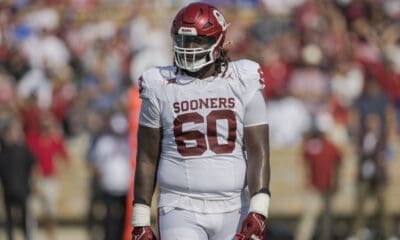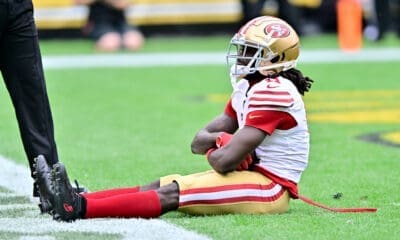NFL
NFL Owners Vote on Rule Changes for 2019 Season

Owners, general managers and coaches around the league assembled in Phoenix, Arizona for the annual meetings between all 32 clubs of the National Football League.
2019’s meetings were perhaps a bit more anticipated than usual, and this was for a few different reasons. For Steelers fans, it was a chance to hear head coach Mike Tomlin speak to the media for the first time since the departures of Antonio Brown and Le’Veon Bell. For Patriots fans, it was the potential for a Robert Kraft sighting for the first time since a scandal involving a massage parlor grabbed national headlines.
Outside of the drama, rule changes typically dominate talk around meetings, and this year was no exception. Controversial calls changed the landscape of the league late last season in two games surrounding the New Orleans Saints, including one call many Steelers fans are all too familiar with.
Joe Haden got called for DPI on this. pic.twitter.com/3ABVOqwJOG
— NFL Update (@MySportsUpdate) December 23, 2018
After a furious outcry from the entire city of New Orleans, it was inevitably the league would be forced to change the protocol for officiating. On Tuesday night, the league approved a number of rule changes for the 2019 season. 24 of 32 teams are required to be in agreement before a rule changes/passes.
Rule changes for 2019 are as follows:
Pass Interference Now Available for Review
This rule change will generate the most conversation among the rest of the pack, and rightfully so. Coaches now have the power to challenge offensive or defensive pass interference penalties, whether or not it was called on the field. Coaches will be allowed to challenge these calls until the final two minutes of each half, where they then are unable to challenge the call. This is similar to how the rules are currently set for coaches challenges.
This will be mostly well received, although opposition of the rule change will be quick to point out what will surely be a rule that extends a game that is already too long, as the average NFL game lasts 3 hours and 12 minutes. The ongoing argument of saving time against getting calls right will continue to bleed into 2019, as the league has yet to balance the two for its viewership.
However, many believe in taking the time to make the right call, even if it means enduring a longer product of football.
*This rule is only approved for the 2019 season and will be reviewed the following season*
Blindside Blocks Are Now Eliminated
The NFL’s efforts to crack down on player safety continues into 2019, as the league has now made blindside blocks illegal moving forward.
To expand protection of the player being blocked, @NFL owners voted to eliminate blindside blocks. One-third of all concussions on punts were caused by blindside blocks. With the rule change, any forcible contact by the blocker with his head, shoulder or forearm is prohibited. pic.twitter.com/abA2cENnXe
— NFL Football Operations (@NFLFootballOps) March 26, 2019
As the game shifts towards an era where bone-crushing hits become more and more rare, the elimination of blindside blocks won’t force any major changes to the game of football the NFL has produced since the turn of the decade. We continue to grow further away from the hard-nose/smack-mouth era of football. Good or bad? While you be the judge, yet the NFL will continue to take these measure to lower concussions, which continues to be a major cloud over the league.
Approved Kickoff Rules From 2018 Now Permanent
The third and often most forgotten facet of football, special teams, also got a makeover with rule changes before the 2018 season. Last year, the league decided to outlaw wedge blocking (two players blocking shoulder to shoulder) and eliminated a running start for the kickoff team.
The results? A 38% reduction in concussions during kickoffs when compared to 2015-2017 seasons (per NFL Football Operations). As mentioned in the above rule change, the league continues their efforts to move towards a safer game. The 2018 rule change now becomes permanent, and has received little to no backlash during it’s one year implementation.
Celebration Penalties Extended to Kickoffs
Scenario: The opposing team takes a 90 yard punt back for a touchdown and draws within one point of tying the game. After crossing the white line to the end zone, the opposing player decides to give the bird to each and every fan in the stadium. The referee obviously draws the yellow flag and calls the player for unsportsmanlike conduct.
In years past, you were only able to apply the penalty on the following kickoff. However, the NFL has now adopted a rule change where teams can opt for yards added on the kickoff, or enforce the 15 yards on a point after try (PAT). So instead of kicking a potential 33 yard extra point attempt, the other team is now forced to kick a 48 yard attempt.
The league has loosened its grip on celebrations, as flags for excessive celebration are far and few between. However if any extra-curricular activity happened that warranted a penalty, teams now have a strategical option to exercise. These moments could be big in key parts of the game, and should force players to think twice about doing something regrettable.
Coaches Challenge Changes
In the past, if a coach were to win their first challenge, they were then able to use two more challenges no matter the outcome. However, a new rule adjustment will require coaches to win their first two challenges before being awarded a third challenge.
The new implementation awards coaches for being accurate on their challenges, while forcing coaches to think twice about throwing the red flag on the field. This rule was likely done to prevent coaches from halting the flow of the game by challenging questionable plays.
Other Rule Changes
Per official team websites (i.e. NewOrleansSaints.com), the following rule changes have also been made in addition to those listed above. For the following rule changes, there have yet to be any detailed/further elaborations as of now.
- By Competition Committee; Expands protection to a defenseless player.
- By Competition Committee; Changes the enforcement of double fouls when there is a change of possession.
- By Competition Committee; Simplifies the application of scrimmage kick rules for missed field goals.
- By Competition Committee; to amend Rule 15, Section 1, Article 5 to allow League personnel to disqualify for both flagrant football and non-football acts.
- By Buffalo; to amend Article XVII, Section 17.4 to liberalize the rule for re-acquisition of a player assigned via waivers.
- By Competition Committee; to amend Article XVII, Section 17.1 to provide clubs with more roster flexibility during training camp.
- By Competition Committee; to amend Article XVIII, Section 18.1 to provide teams more effective access to players during the postseason.
- By Competition Committee; to amend Article XIV, Section 14.3(B)(8) to make the tie-breaking procedures fairer for the selection meeting.
- By Competition Committee; to amend Article XVII, Section 17.1 to provide additional roster spots during the preseason.
- By Competition Committee; to amend Article XVII, Section 12.3 to offer more roster flexibility.
- By Competition Committee; to amend the Anti-Tampering Policy to permit an interested club to contact a Vested Veteran before clubs have been notified of the player’s termination via the Player Personnel Notice if (i) the players is not subject to the Waivers System and, (ii) the employer club has publicly announced the player’s release.
- By Competition Committee; for one year only, Clubs will receive the League’s postgame responses to officiating inquiries submitted by any club.
Other Rule Propositions:
Changes to Overtime
The Kansas City Chiefs proposed an overtime rule that would assure both teams a possession in an overtime period. This stems from their conference championship loss against New England, where the Patriots scored a touchdown on the first possession of the overtime period and effectively ended the game.
The overtime rule changes don’t stop at the postseason, as SB Nation reports the rule change would also eliminate overtime in preseason games and coin-tosses at the beginning of the overtime period, instead awarding first choice of possession to the team who won the initial coin-toss at the beginning of the game.
The decision has been tabled for the time being, as talks will resume during spring meetings in May.
Changes to Onside Kickoffs
The Denver Broncos proposed a rule change that would mirror what the AAF has implemented in their game. Rather than attempt an onside kick that was converted at a whopping 7.5% in 2018 via Elias, a team would attempt to convert a 4th and 15 at their own 35 yard-line. If successful, the offense would stay on the field. If unsuccessful, the defensive team would take over wherever the ball was stopped.
The proposal was rejected by NFL owners, despite being endorsed by the NFL’s competition committee.
Dallas and Detroit hit the Road for Thanksgiving
A rule proposal was submitted and later retracted by the Philadelphia Eagles that would have forced the Dallas Cowboys and Detroit Lions, two traditional home fixtures on Thanksgiving, to rotate playing at home and away on the holiday. While no true reason was given for the retraction, it’s likely the support would not have been serious enough to go to a vote.














